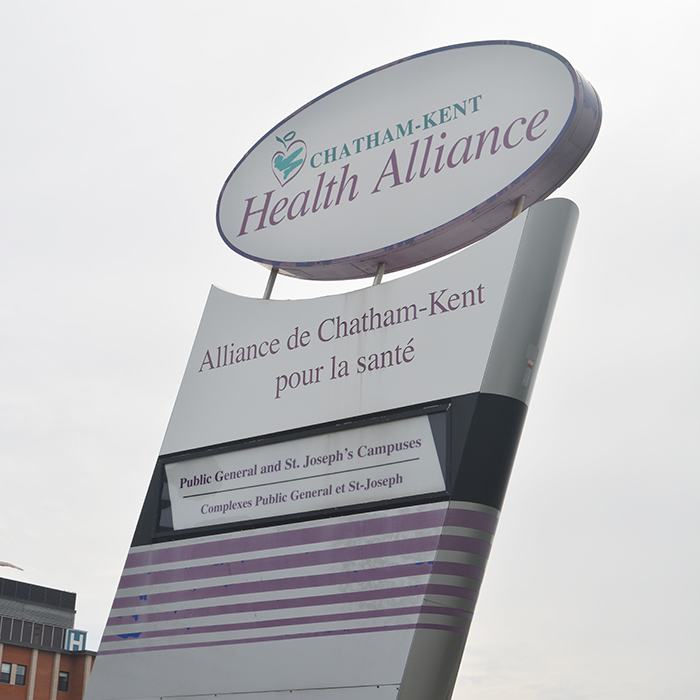Windsor-Essex hospitals struggling with capacity
By Bruce Corcoran
The Chatham-Kent Health Alliance is opening up its doors to Windsor-Essex patients, while at the same time cancelling elective and non-urgent surgeries.
Lori Marshall, president and CEO of the CKHA, said the two are not directly related.
In the case of the cancellation of all but cancer, urgent and emergency surgeries, she said that decision is due for the need for ventilator-trained personnel to be utilized in the Intensive Care Unit and in critical care.
“The increase (in COVID-19 cases) in the community is leading to increased demands on the hospital system,” Marshall said in a teleconference with local media. “Our critical care beds are at 100-per-cent capacity. In our ICU, nine of 10 patients in there are on ventilators, but only one of them is COVID positive.”
Due to patient levels, CKHA officials made the decision to cancel the elective surgeries to feed needed personnel to critical care, and four additional beds have been opened up in that unit, Marshall said, all with ventilators.
“We anticipate our critical care needs are only going to grow. We made the transition of four progressive care beds to critical care. We need the staff trained to work with ventilators there,” she said. “They are those who work in our operating rooms and our recovery room.”
As well, Windsor Regional Hospital transferred in five patients to CKHA on Tuesday and five on Wednesday.
Windsor hospital officials say a high volume of patients who are positive with COVID-19 and requiring admission to hospital have forced WRH to begin transferring some patients to the care of CKHA and Bluewater Health in Sarnia.
“Our aging infrastructure cannot accommodate safe, quality care for all of our patients given the recent surge in COVID-19 patients requiring admission to hospital and requiring isolation protocols,” said Karen Riddell, WRH chief nursing executive and COO, in a media release.
The influx of Windsor patients to CKHA comes on the heels of Erie Shores Healthcare, the hospital in Leamington, sending a dozen patients to CKHA on New Year’s Eve.
Marshall said none of the incoming or recently arrived patients from outside our municipality are COVID positive at this point. She added that the Ministry of Health gave CKHA surge funding for 20 additional beds specifically for regional purposes if needed.
“Normally, CKHA receives an allocation of five beds to support our needs during normal flu season,” she said. “This year, we were allocated 20, and all along they were designated as regional beds.”
Of the Erie Shores patients who arrived Dec. 31, Marshall said none were admitted to the ICU and all are there for recovery or rehabilitative care. She said none are coming with a COVID-positive tag.
“None of these planned transfers, to our knowledge, contained COVID cases. Whenever we have an individual admitted to our hospital that has been admitted to another hospital, we treat those individuals as being potential,” Marshall said. “We put them into isolation.”
But she admitted it is possible one of the incoming or recently arrived outside patients could have COVID.
“When you look at the cases and the positive percentages we are seeing in our region, and you look at the number of admissions, it is possible we will have a transfer in,” she said. “But right now, what is more likely is we are going to see our own cases rise.”
Currently, CKHA has five COVID cases in hospital, Marshall said. Four are from Chatham-Kent, while the fifth is from outside the area, but not attached to the patient transfers.
The CKHA is at 93-per-cent occupancy at the moment, not factoring in the 20 regional beds. Marshall said the goal is to remain near the 90-per-cent mark.
In terms of regional bed usage, Marshall said the alliance is currently in intake mode, but regional beds are in place to allow for outflow of patients as well if that is needed
“If we get another surge, if we can’t provide the level of care needed, we would look to transfer the patients to hospitals where such care can be provided,” she said.
Marshall said the field hospital remains ready, if needed. The 20 regional beds were initially earmarked for that offsite location.
“We had a conversation with the ministry at that time and worked with them to manage those patients onsite versus outside in another facility,” Marshall said. “The level of care at the field hospital would be an altered level of care not requiring acute care services. They wouldn’t have X-rays or a lab on site. The field hospital was never intended for our most acutely ill.”
She added it remains “our best insurance policy. I hope we would not have to use it.”
As for what the future holds, Marshall expects COVID-19 numbers to continue to rise in the short term.
“I believe we are now 11 days out from Christmas. I saw a survey that said roughly 50 per cent of the population was visiting over the course of the holidays. Unfortunately, in the short term, I believe we will continue to see the number of cases rise,” she said. “Over the next few weeks and perhaps the next month, it might be difficult from a patient capacity point.”
Marshall asks people to do their part to help slow the climbing COVID numbers.
“I urge people to stay home, do their social distancing, wear their masks, do everything they possibly can to stay safe. And that will help our hospital,” she said.
As for the vaccine, which has yet to arrive in Chatham-Kent, Marshall said the freezer to store it arrived today, so they are ready to receive doses of the vaccine.
The plan, she said, working with CK Public Health, remains to provide it to the most vulnerable first, and long-term care staff.
No word yet from the province on when vaccine doses will be coming to Chatham-Kent, however.







